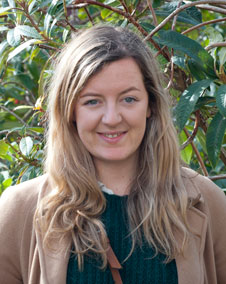Jayde Flett: PhD candidate
 When Jayde Flett tells new acquaintances that she studies Psychology, she is often asked "So, are you going to read my mind?"
When Jayde Flett tells new acquaintances that she studies Psychology, she is often asked "So, are you going to read my mind?"
Jayde is quick to point out that no, she cannot read your mind and nor does she want to! Rather, she is constantly striving to understand and explain how people think, act, and feel using scientific principles, observation, and interpretation.
She is, in fact, more intrigued by whether your mobile phone can be adapted to provide you with a psychological intervention or assist you to participate in your own healthcare, rather than the ins and outs of the corners of your brain.
While her studies have previously focused on language, technology, social exclusion, and positivity, Jayde's professional sphere has extended to working with people with a number of health experiences ranging from chromosomal disorders to a case of stroke induced "locked-in syndrome". She has come to appreciate that everyone deserves the opportunity to live what they deem a "normal life", and that quite often, this life is facilitated by technological advances.
"It is for this reason that I am interested in pursuing specialisation within the field of Mobile Health (mHealth). This refers to a growing field in which mobile devices are broadly utilised to provide improved patient care and to strengthen healthcare systems. During my PhD, I hope to better understand the potential uses and strategies of mHealth technology to reduce the effects of depression, stress, and anxiety especially in young adult, marginalised, and indigenous populations. I also hope to have a better knowledge of how these tools can be utilised by policymakers to enact a long-term mHealth strategy that benefits both New Zealand and wider populations."
Jayde's first research project, supervised by Professor David O'Hare, focused quite literally on whether PowerPoint was making people stupid. They posited that because PowerPoint encourages linear thinking, the reduction of complex ideas to bullet points, and doesn't allow for deviation from a preconceived presentation, perhaps people were unable to formulate their own complex thoughts in relation to something they have learnt using PowerPoint. Using a computer programme created at the University of Memphis called Coh-Metrix to analyse the complexity of participants' written responses on a syntactical level, they found that various complexity measures were reduced following a PowerPoint presentation. Whilst this experiment had its limitations, it sparked Jayde's interest in the ways in which technology can be used to help or hinder us.
"My honours dissertation was supervised by the late Dr Tamar Murachver where we were interested in how social exclusion affected language use. Eventually we found that, like depression, social exclusion imparts a marked effect on language use and this effect can be picked up using basic linguistic analysis software. Dr Murachver invited me to apply for a Summer Studentship so I could explore my research further. This time we incorporated a positive psychology aspect to the previous study to see whether a simple positivity exercise would nullify the effect of social exclusion found in individuals' language use and wellbeing. It did! At the most basic level this study indicated the possible significance of technology in the detection and treatment of various conditions and also illustrated how simple interventions could have potential positive impacts on individuals."
Following the completion of her psychology degree, Jayde endeavoured to finish her anthropology degree while spending a semester working as a Senior Research Assistant in the Daily Experiences Laboratory for Dr Tamlin Conner. She then concluded her undergraduate experience with a semester abroad at Charles University, Prague, Czech Republic.
On her return, Jayde joined the Department of Psychological Medicine and the Department of Psychology in the capacity of PhD candidate under the joint supervision of Professor Harlene Hayne, Dr Tamlin Conner, and Dr Tess Patterson. Their combined research focuses on the clinical and population correlates of health and wellbeing, clinical intervention, and using mobile technology to track and measure daily life. This supervisory dream team was therefore the logical starting point for commencing a PhD that focuses on improving student wellness using mobile technology.
"Although it is early days, we have run several qualitative studies examining the benefits and barriers to mHealth uptake, we have trialled the effectiveness of several publicly available mobile mindfulness meditation apps, and we are part-way through a clinical trial.
"With Tess taking the clinical lead as PI, we are currently working in conjunction with Dr Kim Ma'ia'i (Director of Student Health Services) and the Counselling team in Student Health Services to test the effects of mobile mindfulness on clinical health and wellbeing in a distressed clinical population.
"Studying at the University of Otago has afforded me so many great opportunities to work and mingle with great minds; I feel very privileged to have received this opportunity."
Jayde was recently awarded a Division of Health Sciences MacGibbon Travel Fellowship from the Alumni of the University of Otago in America, to attend the University of California as a visiting research student with Associate Professor Iris Mauss (recent recipient of an APA Distinguished Scientific Early Career Award) in the Emotion and Emotion-Regulation Lab.
Here, Jayde will gain further specialisation in psychophysiology in order to apply a combination of subjective (e.g. self-report) and objective (e.g. cardiac vagal tone) measures of wellbeing when assessing intervention outcomes.
For more information, please email Jayde.
Email jayde.flett@otago.ac.nz